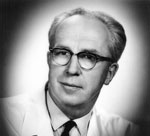Our History

Dr. Charles H Rammelkamp, Jr. for whom the education and research center is named, made exceptional contributions to clinical research, teaching and patient care. Most notable was his career-long interest in the cause, prevention, control and treatment of streptococcal infections – research that revolutionized strep diagnosis and management and dramatically reduced deaths from rheumatic fever.
During Dr. Rammelkamp’s 22 years as director of medicine at City Hospital (now MetroHealth), he developed an outstanding residency training program and earned the loyalty and dedication of his house officers. He was an extraordinary teacher and was deeply concerned about his students’ personal welfare.
Known as “Ramel” to friends and colleagues, Dr. Rammelkamp affectionately called house staff members his “birds” and often stayed up nights with them caring for patients.
Residents’ long hours were supplemented by “Ramel Rounds” every Sunday morning. One of Ramel’s “birds” said this exhausting seven-day work week was tolerated because, “He taught us about people….he caught us all up in his ability to learn from the patients”.
One of Dr. Rammelkamp’s outstanding attributes was his lack of desire for power or prestige. He therefore shunned medicine’s political arena, but he would logically and sometimes emotionally plead the case of public hospitals. He argued that public hospitals should be the clinical settings for originating and evaluating new equipment, drugs, therapies and patient care programs.
First-rate medical care, Dr. Rammelkamp believed, is more likely to be provided by institutions devoted not only to treating patients, but to advancing knowledge and educating new generations of medical professionals.
MetroHealth – Case Western Reserve University Affiliation
In 1914, the medical management of City Hospital became affiliated with the Western Reserve University School of Medicine, one of the nation’s most respected medical schools. An agreement was signed between the city and the university, by which the university assumed responsibility for the care of all patients and would nominate the full-time staff of the hospital. This relationship assured that City Hospital doctors would be trained in the latest medical advances and expand the opportunities for teaching and research. This agreement is still in effect today.